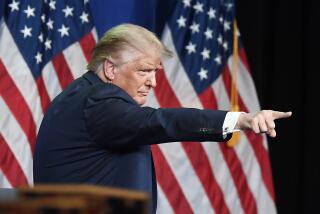It’s Down to Whopper vs. Big Mac
- Share via
Scarcely a week after he confessed that he had barely read the platform on which he would be running for president, Bob Dole responded to a questioner at a convention of black journalists in Nashville by airily repudiating one of its planks. The GOP candidate’s casual disavowal of his party’s pledge to deny automatic citizenship to the American-born children of illegal immigrants was a little like a minister, a week after his ordination, proclaiming that he did not subscribe to one of his denomination’s major tenets.
Dole’s disdain for his party’s statement of principles prompts questions that go beyond platforms and agendas and extend to the authors of these quadrennial television pageants: the political parties and what they have become.
Leaving aside the officials and employees of the Democratic and Republican state and national organizations, only two groups of Americans really care much about the parties: journalists and political scientists. The reason for the attachment of these groups to institutions that almost 40% of the electorate has declined to affiliate with is pretty simple. If you know that a voter identifies himself or herself as either a Democrat or Republican, it gives you a pretty good handle on how that person is likely to vote. Far more elusive are the intentions of the 39% of registered voters who, according to the most recent Pew Research Center poll, consider themselves independent of either major party. Roughly 60% of voters identify themselves as Democrats and Republicans. This attachment to political parties is at an all-time low and likely to head lower.
Does this mean that parties are headed for extinction like creatures who are unable to adapt to their changing habitat? No, it simply means that parties and party leaders need to be seen not as independent sources of power or guardians of enduring principles to which candidates must adhere, but in their new role as franchisers, bankers and caterers.
For candidates for public office, the party brand name remains essential. A politician would no sooner run without the franchise power of the Democratic or Republican label than a fast-food company would market its burgers in a plain brown wrapper unadorned by anything but a UPC symbol. Party identification also is essential to our legislative system. In Congress and the state legislatures, control of a chamber is determined by which party is in the majority. The president and governors, moreover, depend on the support of their legislative partisans. But franchise loyalty can be uncertain, as we have seen in recent years with the large-scale defection of Southern Democrats to the GOP and mass Democratic defections from President Clinton on such issues as NAFTA and welfare reform.
What has been most conspicuously on display in recent weeks has been the newest functions performed by the parties: catering national conventions and bankrolling campaign activities that support presidential and congressional candidates.
Like any good caterer, the national committee will not only provide food, drink and souvenirs for the guests; it also offers publicity, videotaping and advice to the principals. Most prominent at the two party headquarters buildings in Washington are not theorists and policy experts but media consultants and specialists in campaign logistics. And unlike the party chairmen of old, the GOP’s Haley Barbour and the Democrats’ Christopher Dodd were chosen not to be independent brokers but telegenic “talking head” impresarios.
But it is as bankers that the parties serve their most useful current function. As the result of campaign finance reform that favors contributions to “party-building activities” over funds expressly for individual candidates--money from almost any source that need not be reported to the Federal Election Commission--the parties have become the ATMs of American politics.
The platforms on which the parties stand endure no longer than the presidential candidates who dictated them. President Clinton was able to impose his policy wishes more thoroughly than Bob Dole could control his platform writers, so Clinton will have to issue no disavowals. Dole probably will continue to distance himself from the GOP platform, as may candidates for other offices.
It is little wonder, then, that Americans puzzle over what the parties stand for. They have meaning and value only to candidates; their conventions are important only to the delegates, most of whom come just to whoop it up. Beyond that, the parties’ only purpose seems to be bankrolling campaigns. And not many Americans feel endeared to their bankers.
More to Read
Get the L.A. Times Politics newsletter
Deeply reported insights into legislation, politics and policy from Sacramento, Washington and beyond. In your inbox twice per week.
You may occasionally receive promotional content from the Los Angeles Times.










